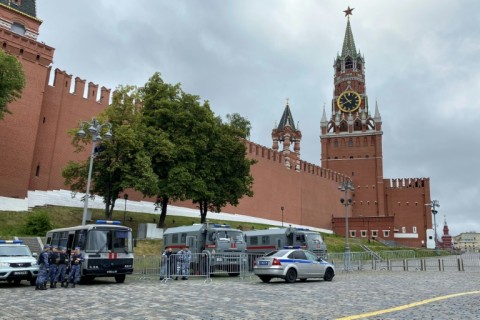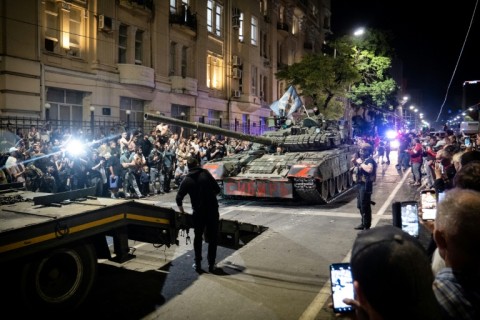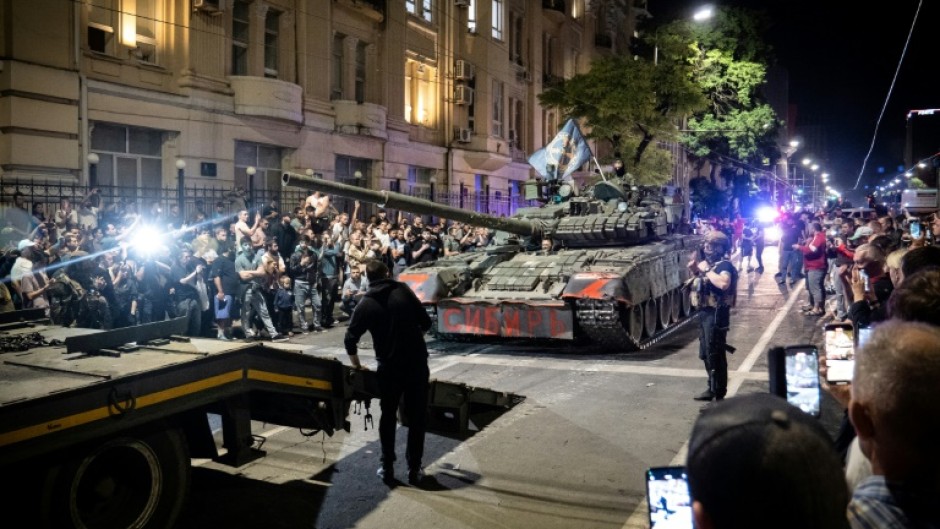
Rebel mercenaries advanced north towards Moscow after seizing a key military base Saturday, just as Kremlin chief Vladimir Putin's vowed to defeat the revolt and head off the threat of civil war.
The rapidly escalating events mark the most serious challenge yet to the Russian president's rule -- and Russia's most serious security crisis since the strongman came to power in late 1999.
Putin's spokesman insisted the Russian leader was still at work in the Kremlin and had not fled Moscow, as regular forces launched a "counter-terrorist operation" to halt the rebel advance in the Voronezh region, on the Wagner force's route to the capital.
The governor of the Lipetsk region, whose capital is just 420 kilometres (260 miles) south of Moscow, said Wagner's private military force was "moving across" the territory and urged civilians not to leave their homes.
Ukrainian leaders, meanwhile, revelled in the outbreak of in-fighting among its Russian foes, with a deputy defence minister describing it as a "window of opportunity" for Kyiv's latest counteroffensive to rid its territory of Russian forces.
Wagner chief Yevgeny Prigozhin, once a close Putin ally, said his troops had taken control of the military command centre and airbase in the southern city of Rostov-on-Don, the nerve centre of Russia's offensive in Ukraine, and vowed to topple Moscow's top military leaders.

"We got to Rostov. Without a single shot we captured the HQ building," he said, in an audio message on social media channels, claiming that local civilians had welcomed the operation.
"Why does the country support us? Because we went on a march of justice," he said, claiming his men had not killed any soldiers despite having been hit with strikes from army "artillery and after that from helicopters".
Responding to the challenge in a televised address, Putin accused Prighozin -- whose private army provided shock troops for Moscow's offensive in Ukraine -- of a "stab in the back" that posed a threat to Russia's very survival.
- 'Harsh measures' -
"Any internal turmoil is a deadly threat to our statehood and to us as a nation. This is a blow to Russia and to our people," Putin said, demanding national unity.

"Extravagant ambitions and personal interests led to treason," Putin said, referring to Prigozhin, who built his powerbase as a catering contractor to the Kremlin and now runs a private military force.
"All those who consciously stood on the path of betrayal, who prepared an armed rebellion, stood on the path of blackmail and terrorist methods, will suffer inevitable punishment, before the law and before our people," Putin vowed.
The FSB security service accused Prigozhin of attempting to launch a "civil conflict" and urged Wagner fighters to detain him.
Another Putin ally, Chechen strongman Ramzan Kadyrov, declared that he had dispatched his own units to help quash the Wagner rebellion.
"Defence ministry and National Guard fighters of the Chechen Republic have already left for the zones of tension," Kadyrov said on Telegram.
"The rebellion must be put down, and if harsh measures are necessary, we are ready!"
Belarus also backed Moscow in the conflict.
"Any provocation, any internal conflict in military or political circles, in the information field or in civil society is a gift to the collective West," the Belarusian foreign ministry said.
Latvia announced that it was tightening security on its Russian border and would not admit refugees fleeing the chaos.
Inside Ukraine, emergency services said that three people were killed and nearly a dozen injured in Kyiv after what authorities said was an overnight barrage of 40 Russian cruise missiles and at least two attack drones.
- 'Civil conflict' -
After Putin's speech accusing him of treason, Prigozhin launched a second broadside.
"On treason of the motherland: the president is deeply wrong. We are patriots of our motherland," Prigozhin said. "Nobody plans to turn themselves in at the request of the president, the FSB or anyone else."
Russia's headquarters in Rostov-on-Don is a key logistical base for its offensive in Ukraine.
Watching events unfold in Russia as his own forces conduct a slow-moving counteroffensive, Ukraine's President Volodymyr Zelensky said the revolt showed Russia's was failing.
"Russia's weakness is obvious. Full-scale weakness," he said.
"And the longer Russia keeps its troops and mercenaries on our land, the more chaos, pain, and problems it will have for itself later. It is also obvious, that Ukraine is able to protect Europe from the spread of Russian evil and chaos."

Armed Wagner fighters deployed around administrative buildings in Rostov and tanks could be seen in the city centre.
As the insurrection force headed north through Voronezh and Lipetsk towards Moscow, the capital's mayor announced that "anti-terrorist" measures were being taken.
Critical facilities were "under reinforced protection", TASS reported, citing a law enforcement source.
- Missile strikes -
While Prigozhin's outfit fought at the forefront of Russia's offensive in Ukraine, in recent months it has engaged in a bitter feud with Moscow's military leadership.
He has repeatedly blamed Defence Minister Sergei Shoigu and Valery Gerasimov, chief of the general staff, for his fighters' deaths.
The Russian defence ministry warned that Ukrainian troops were taking advantage of the infighting to ready an assault near the eastern hotspot of Bakhmut.

A prominent Russian general urged Prigozhin to call off efforts to remove the defence ministry leadership.
"I urge you to stop," Sergei Surovikin, commander of Russia's aerospace forces, said in a highly unusual video address.
Washington-based think tank the Institute for the Study of War said the Wagner chief's attempt to force a leadership change in the defence ministry "is unlikely to succeed" given that Surovikin had denounced his call for rebellion.
However, it said Wagner's apparent capture of Rostov-on-Don "would have significant impacts on Russia's war effort in Ukraine".

